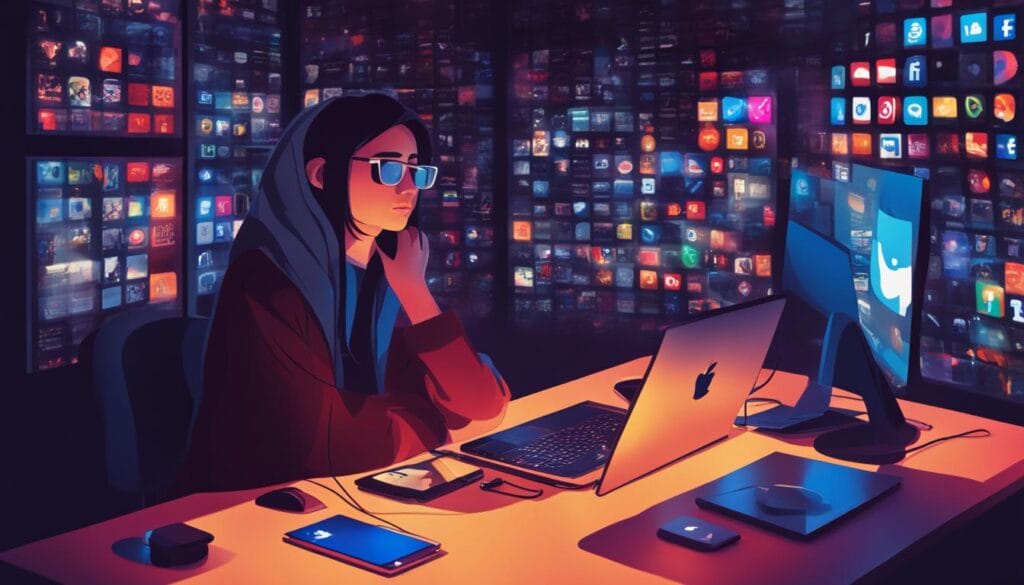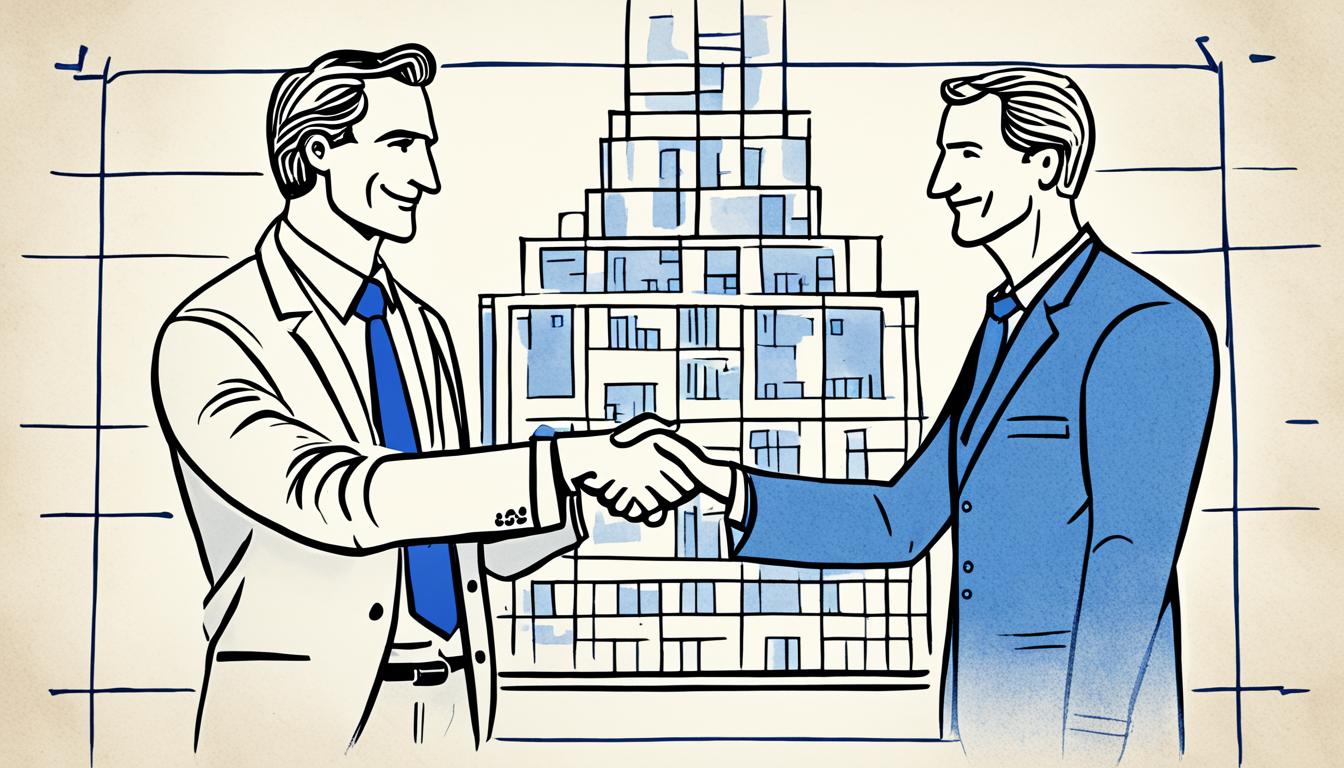Introverts often get a bad rap for shying away from social situations, but it’s important to understand that introversion is a unique personality trait and not a flaw. Introverts prefer to recharge their energy in solitude and tend to be more introspective and thoughtful in their approach to social interactions.
While socializing is an essential aspect of human connection, it’s important to respect introverts’ comfort zones and preferences. Forcing them to socialize can have negative impacts on their mental well-being and ability to form genuine connections.
Key Takeaways:
- Introversion is a unique personality trait that should be appreciated and respected.
- Forcing introverts to socialize can have negative impacts on their mental well-being and ability to form connections.
- Socializing is still important for introverts, but it’s important to find a balance that aligns with their comfort levels and well-being.
- Respecting introverts’ personal boundaries and need for alone time is crucial for their mental well-being.
- Introverts possess unique strengths and traits that should be acknowledged and appreciated.
Understanding Introversion and Socialization
Before delving into the question of whether it’s appropriate to force introverts to socialize, it’s essential to understand what introversion is and how it relates to socialization.
The Basics of Introversion
Introversion is a personality trait that is often misunderstood. It does not necessarily mean shyness or avoidance of social situations. Instead, it refers to a preference for solitude and introspection over high levels of external stimulation.
If you’re an introvert, you may find social situations draining and prefer to spend time alone or with a few close friends. You may also have a rich inner world and enjoy introspective activities such as reading, writing, or meditation.
Introverts’ Social Preferences
Introverts have unique social preferences that differ from their extroverted counterparts. They tend to enjoy deeper, more meaningful conversations with a smaller group of people rather than large, superficial interactions.
Introverts are also more sensitive to external stimuli, such as noise or bright lights, which can make socializing in certain environments more challenging. They may also need more downtime after social events to recharge their batteries.
The Link Between Introversion and Socialization
Despite their preference for solitude, introverts still have a need for social interaction and connection. However, they may approach socializing differently than extroverts.
Introverts may prefer quieter, more intimate social settings and may need more time to build trust and rapport with others. They may also benefit from having structured activities or shared interests to break the ice and facilitate social interaction.
“Introverts, in contrast, may have strong social skills and enjoy parties and business meetings, but after a while wish they were home in their pajamas.”
― Susan Cain, Quiet: The Power of Introverts in a World That Can’t Stop Talking
The Power of Introverts and Their Unique Traits
Introverts possess a range of unique traits that should be celebrated and acknowledged. While introverted behavior may not always align with societal expectations, it is important to recognize the value that introverts bring to different contexts.
One of the most significant strengths of introverts is their thoughtful and introspective nature. While extroverts may thrive in high-stress and fast-paced environments, introverts often excel in situations that require careful consideration and attention to detail. This can make them valuable assets in fields such as research, writing, and other creative pursuits that demand a keen eye for detail.
Introverts also tend to be excellent communicators, particularly in one-on-one interactions. They are often skilled at listening deeply and understanding the needs and desires of others. This can make them valuable confidantes and friends, as well as effective negotiators and problem solvers.
Additionally, introverts often have strong networking skills, despite the misconception that they lack social skills. While they may not enjoy large gatherings or crowded events, introverts can be highly effective at forming and maintaining meaningful connections with a smaller group of individuals. This can result in a tight-knit network of supportive friends and colleagues.
Embracing Introverted Communication Styles
It is important to recognize that introverts communicate differently than extroverts. While extroverts may prefer to think out loud and speak impulsively, introverts often take time to process their thoughts before sharing them. This can result in a slower, more deliberate communication style that may not be well-suited for fast-paced environments. However, it is important to respect and value the contributions of introverts in these settings, even if they may not speak up as frequently as their extroverted counterparts.
The Role of Self-Care for Introverts
Because introverts may find socializing to be draining, it is important for them to prioritize self-care. This can involve taking time to recharge alone, engaging in activities that bring them joy, and setting boundaries that protect their mental and emotional well-being. By prioritizing self-care, introverts can better manage social anxiety and other challenges that may come with socializing.

The Importance of Respecting Introverts’ Boundaries
Introverts have a unique social comfort zone that is essential to their well-being. Understanding and respecting their boundaries is crucial for their mental health and social functioning.
When an introvert feels comfortable and safe in their social environment, they are more likely to engage in meaningful conversations, form genuine connections, and enjoy social events. However, when their boundaries are crossed, they may experience anxiety, stress, and other negative emotions.
Respecting an introvert’s personal boundaries means acknowledging their need for solitude and alone time. This can include giving them space and time to recharge after social events, not pressuring them to attend events beyond their comfort level, and avoiding making them the center of attention.
It’s also important to understand that introverts may have specific preferences when it comes to socializing, such as preferring small groups or one-on-one interactions over large crowds or loud environments. Respecting these preferences and being mindful of how they impact their social comfort can go a long way in creating a supportive and inclusive social environment for introverts.
One way to ensure that you are respecting introverts’ personal boundaries is to communicate openly and honestly with them. Ask them what their comfort level is in different social situations, and listen to their responses without judgment. This can help you avoid inadvertently crossing their boundaries and foster an environment of mutual respect and understanding.
“Respecting someone’s boundaries is important for both introverts and extroverts. It’s about creating a comfortable and safe space for individuals to express themselves without fear or pressure.”
The Impacts of Forcing Introverts to Socialize
Pushing introverts beyond their comfort zones can have negative repercussions on their mental well-being. While it may seem like a good idea to encourage introverts to socialize more, doing so without their consent or understanding of their preferences can lead to increased social anxiety and stress.
Introvert social anxiety is a real concern that can arise from forced socialization. Introverts often feel overwhelmed in large social settings and may struggle with making small talk or engaging in group activities. Forcing introverts to participate in these situations can lead to feelings of isolation, inadequacy, and even panic attacks.
It’s important to recognize that introverts have different social needs than extroverts and require more time to recharge after social interaction. This is where introvert self-care comes in. It’s crucial for introverts to prioritize self-care to maintain their mental well-being and prevent burnout.

Introvert’s self-care can take many forms, such as spending time alone, engaging in hobbies, or simply taking a break from social interaction. By prioritizing self-care, introverts can better manage their social anxiety and navigate social situations in a way that aligns with their comfort levels.
Remember that introverts are not anti-social, they simply have different social preferences and comfort levels. Forcing them to socialize can damage their mental health and hinder their ability to form meaningful connections. Respect their boundaries and honor their need for solitude and self-care.
Finding Balance: Socializing in a Way that Works for Introverts
As an introvert, socializing can be challenging. However, it’s important to find a balance between your need for alone time and engaging in social activities that align with your comfort levels and well-being. Here are some tips for introvert socializing:
Choose social activities that align with your interests
When choosing social activities, consider your interests and passions. This will make the experience more enjoyable and engaging. Whether it’s joining a book club or attending a museum exhibit, finding activities that align with your interests can help facilitate meaningful connections with others.
Practice social interaction in small doses
Introverts often prefer small, intimate gatherings over large group events. By practicing social interaction in smaller doses, such as meeting up with a friend for coffee or attending a small dinner party, you can build your social skills without feeling overwhelmed.
Be mindful of your social anxiety
Social anxiety can be a challenge for introverts. It’s important to recognize when you’re feeling anxious and take steps to manage your anxiety, such as deep breathing or taking a break from social interaction. By being mindful of your social anxiety, you can ensure you’re taking care of your mental well-being while still enjoying socializing on your own terms.
Set boundaries for yourself
Setting boundaries is key for introvert self-care. This can mean saying no to social invitations when you need alone time or setting a time limit for socializing. By setting boundaries for yourself, you can prioritize your own mental health and ensure you’re engaging in social activities in a way that works for you.
Build a self-care routine
Self-care is crucial for introverts to maintain their social well-being. This can mean taking time for quiet reflection and alone time, engaging in activities that bring you joy and relaxation, and prioritizing your mental health through practices such as meditation or yoga.
“Introverts tend to be better at socializing in smaller doses. Instead of pushing yourself to attend a large party, consider meeting up with a friend for a more intimate gathering.”
By approaching socializing on your own terms, you can build meaningful connections while still honoring your introverted nature. Remember, socializing is an essential aspect of human connection, but it’s important to find a balance that works for you.
Tips for Introverts to Navigate Social Events
If you’re an introvert, attending social events can be challenging, but with the right approach, you can still have meaningful experiences. Here are some tips and techniques to help you navigate social events:
- Plan ahead: If you know you’re attending an event, give yourself plenty of time to mentally prepare beforehand. This can mean taking some alone time to recharge or scheduling in some self-care activities.
- Set realistic expectations: It’s important to have realistic expectations for yourself. Don’t try to take on too much social interaction, and don’t feel like you have to be the life of the party. Simply aim to make a few genuine connections.
- Find a wingman: Having a trusted friend or family member with you at events can help ease your social anxiety and provide a comfortable buffer.
- Use small talk as a launchpad: Small talk can be dreaded by introverts, but it can also be used as a way to find common interests and develop deeper conversations.
- Take breaks: If you start feeling overwhelmed or burnt out, take some time to step away and recharge. This could mean finding a quiet corner to relax in or taking a quick walk outside.
- Practice gratitude: Rather than focusing on what you’re missing out on by being introverted, try to focus on the positive aspects of yourself and your unique approach to socializing.
Remember, socializing for introverts can be challenging, but it’s not impossible. By using these tips and techniques, you can navigate social events in a way that works for you.
Leveraging the Benefits of Socializing for Introverts
While many associate socializing with extroverts, introverts can also benefit greatly from engaging in social activities that align with their preferences and comfort levels. Here are some of the benefits of socializing for introverts:
- Development of Empathy: Socializing provides an opportunity for introverts to connect with others, understand their perspectives, and develop empathy. This can lead to deeper relationships and a greater sense of belonging.
- Expansion of Social Circles: Socializing allows introverts to meet new people and expand their social circles, which can lead to new opportunities and experiences.
- Opportunity for Deep Connections: While introverts may prefer fewer but deeper connections, socializing can provide the opportunity to form meaningful, long-lasting relationships.
- Improved Mental Health: Socializing has been shown to have positive effects on mental health, including reducing stress and improving overall well-being.
It’s important to note that respecting introverts’ preferences and boundaries is crucial for them to fully leverage the benefits of socializing. This means understanding their social comfort levels and allowing them to socialize in a way that aligns with their needs.
“Socializing provides an opportunity for introverts to connect with others, understand their perspectives, and develop empathy.”
By respecting introverts and offering opportunities for socializing that respect their boundaries, you can help them reap the benefits of social interaction and lead happier, healthier lives.
Nurturing Introverts’ Social Lives in the Digital Age
As an introvert, socializing in person can be challenging at times. Thankfully, the digital age provides new opportunities for introverts to socialize from the comfort of their own home. Social media platforms and internet forums allow introverts to connect with others who share their interests and hobbies.
However, it’s important to approach online socializing with caution and intentionality. Here are some tips for making the most of your introvert socializing choices online:
- Choose platforms that align with your values and interests. Not all social media platforms are created equal, and some may be more draining or overwhelming than others. Take the time to research and choose platforms that you genuinely enjoy and feel comfortable using.
- Set boundaries for your online interactions. Just like in-person socializing, it’s important to set boundaries for your online interactions. Don’t feel obligated to respond to messages or engage in conversation if you’re not up for it.
- Don’t compare yourself to others. Social media can be a breeding ground for comparison and self-doubt. Remember that the images and posts you see online are often curated and edited to show only the best parts of someone’s life.
- Use social media as a supplement, not a replacement, for in-person interactions. While online socializing can be a great way for introverts to connect with others, it’s important to maintain some level of in-person social interaction as well.

“The internet has given introverts a great new platform to connect with others who share common interests.”
By approaching online socializing with intentionality and balance, introverts can enjoy meaningful connections and maintain their mental well-being in the digital age.
Educating Others on Introversion and its Value
As you navigate your own introverted tendencies, it’s essential to also educate those around you on the nature of introversion, the value it brings, and why it’s important to respect introverts’ socializing boundaries.
In a society that often places a premium on extroversion, introverted behavior can be misunderstood and undervalued. But by educating others on the unique strengths of introverts—such as their attentiveness, thoughtfulness, and ability to communicate effectively—you can help foster a more inclusive and accepting social environment.
Understanding Introverted Behavior
One key aspect of educating others on introversion is helping them understand what it means to be an introvert. This includes explaining that introverts tend to need more alone time to recharge, prefer deep conversations over small talk, and may feel overwhelmed in large social gatherings.
You can also help others understand that introverted behavior is not a sign of shyness, rudeness, or lack of interest. Instead, introverts simply have a different approach to socializing that involves more reflection and introspection.
Emphasizing the Importance of Respecting Introverts’ Preferences
Another crucial aspect of educating others on introversion is emphasizing the importance of respecting introverts’ socializing preferences. This means refraining from pushing them to attend events or engage in social activities that go beyond their comfort levels.
By making a case for the benefits of honoring introverts’ boundaries, such as increased mental well-being and more fulfilling social interactions, you can help others recognize the value of introverted behavior.
Fostering a Culture of Acceptance and Respect
Ultimately, educating others on introversion is about fostering a culture of acceptance and respect. By normalizing introverted behavior and highlighting its strengths, we can create a more inclusive social environment that values diverse approaches to socializing and relationship-building.
So don’t be afraid to speak up and share your own experiences as an introvert. By doing so, you can help others better understand and appreciate introverted behavior, and create a world where everyone can feel comfortable being themselves.
The Importance of Self-Care for Introverts
As an introvert, navigating social interactions can be challenging and overwhelming, leading to increased social anxiety and potential mental health issues. That’s why self-care is crucial in maintaining your well-being and finding a balance in your socializing choices.
Self-care is an intentional practice of taking care of your physical, emotional, and mental health. It includes setting boundaries, prioritizing alone time, engaging in activities that bring you joy, and seeking support when needed.
When it comes to socializing, self-care is especially important for introverts. It helps you manage social anxiety, prevent burnout, and maintain your energy levels. Here are some self-care strategies to consider:
Prioritize Alone Time
Spending time alone is essential for introverts, allowing you to recharge and reflect. It’s important to prioritize alone time in your schedule and communicate your needs with others. Don’t feel guilty about saying no to social events if you need time to yourself.
Develop a Self-Care Routine
Creating a self-care routine that works for you can help you maintain your mental health and well-being. This might include activities like meditation, journaling, or practicing mindfulness. Experiment to find what works best for you and make self-care a regular part of your life.
Set Boundaries
Setting boundaries is key to practicing self-care, especially when it comes to socializing. Communicate your social preferences with others and don’t be afraid to say no to activities that don’t align with your comfort level. Learning to set boundaries can help you avoid social burnout and maintain your mental well-being.
Remember, self-care is not selfish. It’s an essential aspect of maintaining your mental health and well-being, especially as an introvert navigating social interactions. Prioritize your self-care routine, set boundaries, and communicate your needs with others to find a balance that works for you.

Embracing and Celebrating Introversion
As an introvert, you may have often faced the pressure to conform to extroverted social norms. It’s essential to remember that introversion is a valuable personality trait, and it’s okay to prioritize your comfort zone and mental health in social situations.
Embracing introversion means understanding and accepting your social preferences, honoring your need for solitude and alone time, and finding joy in meaningful connections with others.
Respect Your Comfort Zone
It’s crucial to respect your boundaries and comfort zone in social situations. While it may feel uncomfortable to say no to social events, it’s okay to decline invitations and prioritize your mental health.
Remember that you don’t have to be constantly engaged in social interactions to have a fulfilling social life. You can find meaningful connections with a few close friends or engage in social activities that align with your interests and comfort level.
Prioritize Self-Care
Self-care plays a vital role in introverts’ ability to navigate social interactions and maintain their mental well-being. It’s crucial to prioritize self-care activities that work for you, such as taking time for yourself, engaging in hobbies, or seeking professional support.
Remember that taking care of yourself is not selfish; it’s necessary to ensure you can show up as your best self in social situations.
Find Joy in Your Unique Approach to Socializing
Introverts have a unique approach to socializing, and it’s okay to find joy and fulfillment in that. You may excel at deepening connections with close friends or engaging in thoughtful and meaningful conversations with others.
Take pride in your strengths as an introvert and find ways to incorporate them in your social interactions.
FAQ
Should introverts be forced to socialize?
No, forcing introverts to socialize can have negative impacts on their mental well-being. It’s important to respect their preferences and understand their need for solitude and alone time.
What is introversion and how does it relate to socialization?
Introversion is a personality trait characterized by a preference for solitude and introspection. Introverts may have different social preferences and approaches compared to extroverts.
What are some unique traits of introverts?
Introverts possess strengths such as thoughtful communication and networking skills. They excel in areas that require deep thinking and introspection.
Why is it important to respect introverts’ boundaries?
Respecting introverts’ personal boundaries is essential for their mental well-being and social comfort. Understanding and honoring their need for solitude can positively impact their social interactions.
What are the potential impacts of forcing introverts to socialize?
Forcing introverts to socialize can lead to increased social anxiety and stress. It’s crucial to prioritize their self-care and allow them to socialize at their own pace.
How can introverts find balance in socializing?
Introverts can find balance by understanding their need for alone time and engaging in social activities that align with their comfort levels. It’s about finding a balance that works for them.
What tips can help introverts navigate social events?
Introverts can navigate social events by practicing small talk, managing social burnout, and forming genuine connections. It’s about finding strategies that work for them.
What are the benefits of socializing for introverts?
Socializing offers introverts the opportunity to develop empathy, form deep connections with close friends, and expand their social circles. It can have positive effects on their overall well-being.
How can introverts nurture their social lives in the digital age?
In the digital age, introverts can leverage social media and the internet to socialize, but they should be aware of the potential pitfalls. It’s important to make intentional choices about online interactions.
How can we educate others on introversion and its value?
Educating others on introversion and its value is crucial. We can help others understand introverted behavior, appreciate introverts’ strengths, and foster an environment of acceptance and respect.
Why is self-care important for introverts?
Self-care plays a significant role in introverts’ ability to navigate social interactions and maintain their mental well-being. Setting boundaries and prioritizing self-care supports their socializing choices.
How can introverts embrace and celebrate their introversion?
Introverts should embrace their introversion as a valuable personality trait. It’s important to honor their comfort zones, prioritize their mental health, and find joy in their unique approach to socializing.





